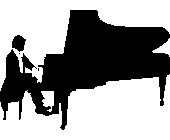C. B. BURKHARDT
Academy of Music
(Hiawatha, a Romantic Symphony,
by Robert Stoepel)
Из: ‘New York Sunday Dispatch’, February 27th 1859.

| Главная страница * Поэма * Форум * Пародии | От автора сайта |
C. B. BURKHARDT
|

|
Should you ask us, why this heading?
Why this old familiar heading?
When the opera has left us,
Maretzek has gone to Cuba,
Taking with him Gazzaniga,
And Stefani and the Gassiers?
Now that Ullman has departed,
Piccolomini and Formes,
Little Tamaro, sweet Poinsot
And Brignoli, have gone southward,
Why we still should print this heading?
We should answer, we should tell you,
The Academy was opened
On the evening of last Monday,
To produce the Hiawatha,
Robert Stoepel’s Hiawatha,
Based upon the famous poem,
But composed in form symphonic,
Form symphonic and romantic,
Musical and most attractive,
Full of choruses and solos,
And descriptive orchestration.
If still further you should ask us
Who is his same Robert Stoepel?
Tell us of this Robert Stoepel?
We should answer your inquiries
Straightway in such words as follows:
“Of musicians the most modest,
Of composers the most genial,
Of a tribe of clever artists,
Hither came he from Teutonia,
From the land of the Germanians.
Here he wooed and won the Heron,
Not the heron, the Shu-shu-gah,
But the Heron called Ma-til-da,
Also famous as an artiste.
Then the twain read Hiawatha,
Read Longfellow’s Hiawatha,
And admired that wondrous poem
And became inspired by it.
Said the Heron, “Let me read it,
Read this song of Hiawatha,
Read it out before the people;
Call to them to pause and listen.
I will read with good discretion,
I will read in tones melodious,
Scarcely shall the ear distinguish
Whether words are sung or spoken,
Get me audiences to hear it,
Hear this song of Hiawatha.”
Then spake Robert, the musician,
The sweet minstrel and composer,
“I, too, feel the sacred fire,
Feel inspired by the measure,
By the subject of the poem,
By its quaint peculiar touches,
And to music will I put them,
Borrow from each voice its graces,
From each instrument its powers,
Thou, sweet concert, thou shalt aid me,
Read me the connecting portions,
That our work may be completed,
And the critics be contented.”
Thus it came that on last Monday,
In the Academic building
Of the island of Manhattan,
Robert Stoepel, the Wabino vocabulory
Of sweet music, by the aid of
Gitche Manito, the Mighty, vocabulory
And a local singing Union,
Yclept Mandelssohn Society,
First presented Hiawatha.
Many came to lend assistance,
Some with flutes and some with fiddles,
Some with big drums, some with trumpets,
Many more with well trained voices,
Beautiful they were arrayed,
That the feast might be more joyous,
That the time might pass more gaily,
That the audience might be pleased.
Mrs. Harwood, the soprano,
From the country to the Eastward,
From the wigwams of the Yankees,
Of the Yankees, the Athenians,
Near the land of wooden nutmegs,
Wooden clocks and wooden nutmegs –
Sang the ditties of Nokomis
By the cradle of Hiawatha,
Sang the song of Minnehaha,
Dying strains of Laughing Water-
And indeed quite well she sang them.
Mister Millard, a brave tenor,
Sharp began his barcarole,
But he quickly took more courage,
Sang the love song very chastely.
He was a most handsome fellow,
Was this tenor, Mister Millard,
Somewhat like the Pau Puk Keewis,
As described in Hiawatha.
“From his forehead fell his tresses
Smooth and parted like a woman’s,”
Shining bright with sweet pomatum,
As before the house assembled
To the sound of flutes and fiddles,
To the sound of drums and voices,
Rose the fine Italian tenor,
And began his jolly “boat song.”
Doctor Guilmette was the basso,
He the Meda and Chibiabos, vocabulory
Sang the song of the Great Spirit,
And with spirit did he sing it,
With good taste and intonation.
Shall we not speak of the chorus?
Of the rich and varied chorus?
At the birth of Hiawatha?
Of the chorus of the ravens,
Of the ravens of Kahgahgee,
With its quaint and dismal accents?
Shall we mention, too, the trio?
Of the ancient arrow-maker,
Minnehaha and Hiawatha?
No, we will not, ’twas not given
Quite as well as we expected,
But the glorious harvest chorus
“’Tis the moon when leaves are falling”
Had a well deserved encore.
Then the ghosts, famine and fever,
Buckadawin, Ahkosewin, vocabulory
And the weird mysterious music,
That surrounds them, almost thrilling,
Almost chilling our heart-strings
As it falls upon the ear.
Such was Stoepel’s Hiawatha,
And the people all applauded,
Clapped their hands and loudly praised it,
As effective, brilliant, genial.
And the good composer promised,
That, if wished for by the audience,
And the people of the nation,
He’d repeat it very often,
Yes, quite often he’d repeat it
Throughout all the land – hereafter.”February 27th 1859
| Главная страница * Поэма * Форум * Пародии | От автора сайта |
WEB-MASTER Визжилин Б.Н. © 2002. Home page, e-mail.